Cultivate Influence Instead of Trying to Make an Impact
What I've learned from my colleague Zee Durón about building a meaningful career
It’s a good idea every once in a while to sit down and reflect on the direction you’re headed. What is the vision for your future? Are you making progress on it?
One of the things I appreciate most about being an academic is the built-in rhythm of the academic calendar. The year is broken up into a series of semester-long sprints with a break at the beginning of the year and a longer change of pace during the summer months. The seasonality provides a natural opportunity to rest, reflect, and re-plan. Whether we take advantage of it is another story.
This week I want to invite you to join me, whether your life is bound to the rhythm of the academic calendar or not, to take a few moments to reflect and to think about who we are and who we want to be.
Lessons from Zee
This semester, Harvey Mudd celebrated the retirement of my colleague, Prof. Ziyad (Zee) Durón. Zee majored in Engineering at Harvey Mudd as an undergrad, graduating in 1981, and then returned as a member of the faculty in 1987 after finishing his PhD down the road at Caltech1. While I only briefly overlapped with the tail end of Zee’s time at the Mudd, I nonetheless learned a lot from him about what it means to build a meaningful academic career.
While I learned some of these lessons from my conversations with Zee over the past few years, I learned even more from attending his retirement celebration a few weeks ago. Zee titled the workshop “Engineering is a Liberal Art to be Celebrated” and invited students who had worked with him over his years at Mudd to come back and share their reflections. It was a wonderful morning of talks and I loved the opportunity to hear from these alumni about Zee’s influence on them, both during their time at Mudd and in the years since.
Lots resonated, but I wanted to focus on three things I took away from the morning to share:
Who, not what, is most important.
Remember why you’re actually here.
Don’t get caught up in the allure of impact, cultivate influence instead.
1. Who, not what
One theme that resonated from Zee’s former students was the way that Zee cared about them as individuals. This, above all else, seemed to have the most lasting impact on them.
College is a really formative time. But it’s also destabilizing. As a student, you don’t have much of a track record to stand on. If we’re honest, even those of us who are further along in our careers can often still find ourselves searching for reasons to believe that we can make a difference.
As I reflect on my own journey, it’s hard to imagine that I would be where I am today without the support of countless mentors and teachers who believed in me. Having someone you respect and look up not only say they believe in you but go the second mile to demonstrate it is a game changer.
There were countless stories (and lots of great pictures) throughout the morning. From the photos of Zee out in the field inspecting dams with his students, to stories of lugging complex measurement equipment across the country to perform field tests, to the photos Zee took of his students laying down on the ground so that he would get just the right angle to capture the moment.
While the engineering work that Zee and his students made a significant contribution to his field and the profession of civil engineering, there is no question in my mind that the greatest artifacts of his career were the students he mentored. It’s about the people.
2. Why are you here? What do you really want?
One of Zee’s former students mentioned a phrase that Zee would tell students in his classes when they would come to talk to him, concerned about their grades.
Are you here for the “A?” I’ll just give it to you.
I might frame this one and put it on my wall. Even such a simple statement helps to peel back the unhealthy emphasis we often put on grades. I’m not saying we should do away with grades entirely (at least not here), but they shouldn’t be the center of our attention.
While I’ve found disputes over grades to be relatively uncommon at Mudd, it is an inevitable fact of human nature that our focus will drift from our actual goals to marks of external validation. At their root, grades should be a piece of information that helps the student to evaluate their grasp of a certain set of concepts. Grades should serve as a mark of expert assessment and indicate areas for growth. Unfortunately, in the competitive world of academia and our desire for credentials to represent our capabilities, it is all too easy to lose this perspective.
Even if you’re no longer in school, it’s a good question to ask: what are you actually here for? If you’re like me and my tenure-track colleagues, the answer might be to get tenure. I think that’s a bad answer. The aspiration and vision should be bigger and more audacious than some mark of external validation.
It’s not wrong to appreciate marks of external validation, but make sure they are plaques on the wall and not bricks in the foundation. External validation is fine as decoration, but a life built on external validation is a life built on sand.
3. Cultivate influence instead of chasing impact
When we talk about someone who has changed our life, we often say that they’ve “had an impact” on us. But I don’t think this is quite right. What we really mean is that they influenced us. I think the difference is more than just semantics and gets to the heart of how to shape people.
I’ve been thinking about this contrast between impact and influence because of a podcast conversation I listened to recently between Curtis Chang and Andy Crouch. This conversation, suggestively titled “The Impact Fetish,” helped me to see how it is important to consider the language we use to talk about developing a flourishing career and in particular to think about the language of impact vs. influence.
In the conversation, Curtis and Andy make the point that the key difference between impact and influence has to do with time. Having a large impact is all about a change in momentum. To do this, you want to deliver a large amount of force, and often the force is delivered in a short amount of time like when a hammer hits the head of a nail or when a car collides with a wall during a crash test. To deliver a large impact, the more force the better.
Through this lens, impact isn’t something we want to have on people. It’s not any use to go around hitting people over the head or trying to exert a lot of force on them. People have a limit to the maximum amount of force they can sustain. Just like a concrete structure can only survive a certain impulse, trying to apply too much force in a relationship can fracture it.
There are other advantages to spreading the application of force out over a longer duration too. Physical systems have a finite bandwidth and people are a lot like low-pass filters. A lot of the energy in a sharp impact is contained in high-frequency components of the signal. These just won’t get through. It’s much more effective to spread the energy out in time so that it doesn’t just get filtered out.
To have influence, play the long game
Influence is about force applied over time. To influence someone we don’t think about trying to deliver the greatest amount of change in the shortest time possible, but rather about what we can do now that will ultimately shape the trajectory of someone’s life—the things can we do now that will take advantage of compounding returns. Most of the time this looks like friendship sustained over many years. Time spent together pondering questions, giving feedback, and caring for one another.
Like so many of the concepts that have been resonating with me over the past few years, the contrast between impact and influence has me thinking again about gardening. Gardening seems to me to be the ultimate archetype: a way of being and living that helps us to see how we can effect change not by directly imposing force or control but by cultivating life-giving processes that lead to flourishing. This, I think, is at the heart of what it means to have a lasting influence.
Zee, thanks for the work you’ve done at Mudd and for having an influence on so many, including me. I’ll miss having you in the office next door. Enjoy your well-deserved retirement, and come visit your fellow Caltech alum sometime soon. You know where to find me.
The Book Nook
The Word is Murder was our most recent read in our murder mystery book club. This was the second of Anthony Horowitz’s books that we’ve read. Like the first (Magpie Murders), we also enjoyed this one. Highly recommended!
The Professor Is In

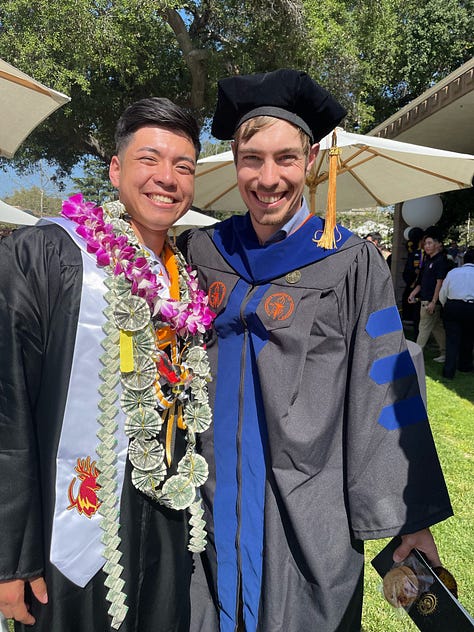

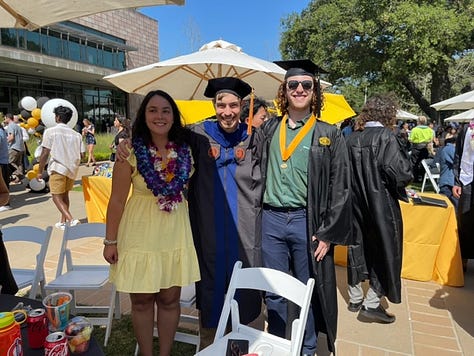
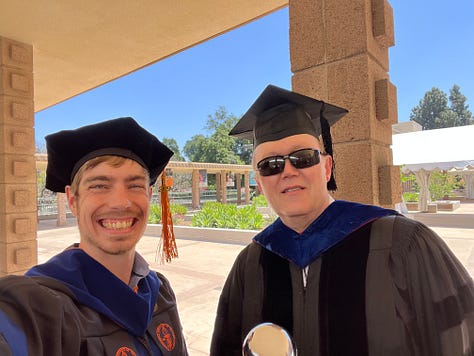
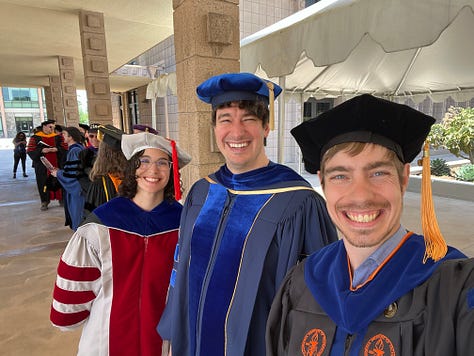
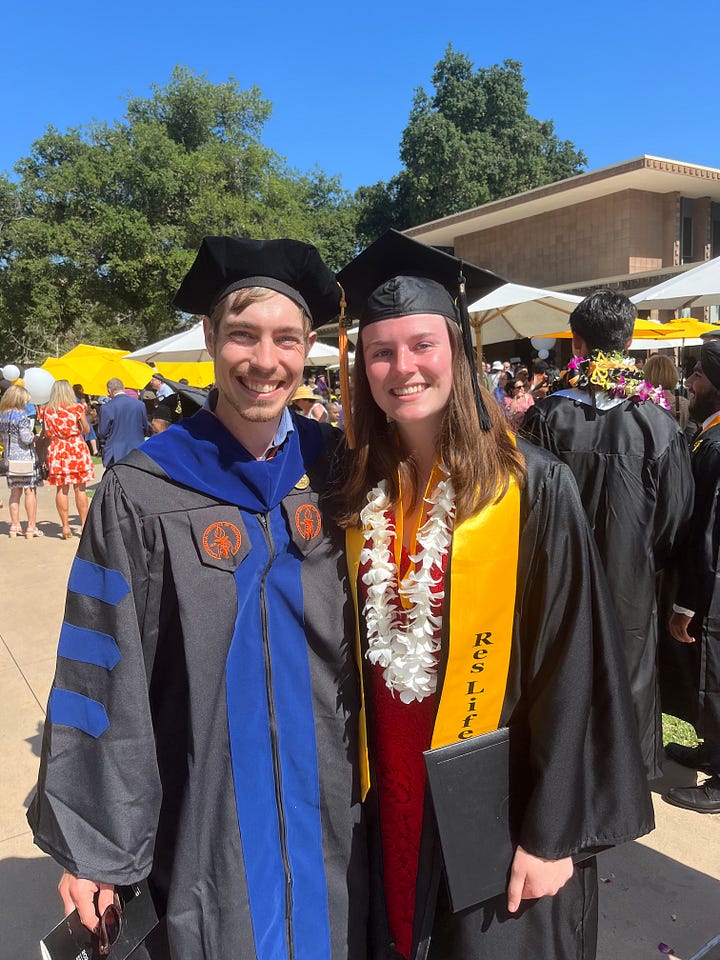
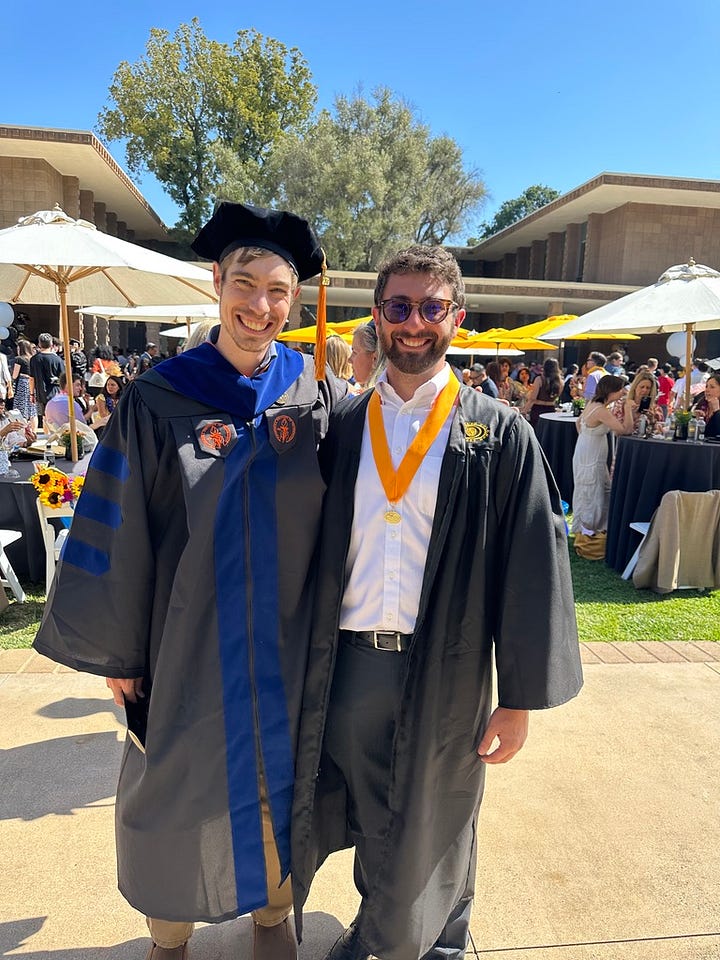
On Sunday we celebrated the Harvey Mudd College graduating class of 2023. Commencement is always a fun event and it’s so great to celebrate all the students and their hard work.
This year’s commencement also featured a few speeches that I appreciated and wanted to share. The first was given by a graduating senior, Sonia Bliss. She spoke about the power of friendship and how the Harvey Mudd community helped her to grow in confidence and come out of her shell. Sonia was followed by the invited commencement speaker Michael Ellison who encouraged the graduates to be audacious and embrace failure. Sounds like Michael gets the prototyping mindset!
Start watching at 1:16:07 if you want to jump right to their speeches.
Leisure Line
With the semester wrapped up I’ve had some more time to spend with the kiddos. Inspired by Kevin Kelly’s advice that I wrote about last week to spend half as much money and twice as much time with your kids as you think you should, I spent some time in the backyard this week constructing a makeshift fort out of cardboard. It was a hit.
Still Life
The agave plant in our front yard is blooming! The stalk in the center is growing quite rapidly, probably at least a foot a week.
Zee also did a Master’s at the other Institute of Technology. I’ll let you figure out what that is, but the t-shirt here might give you a hint. Make sure to check the back.




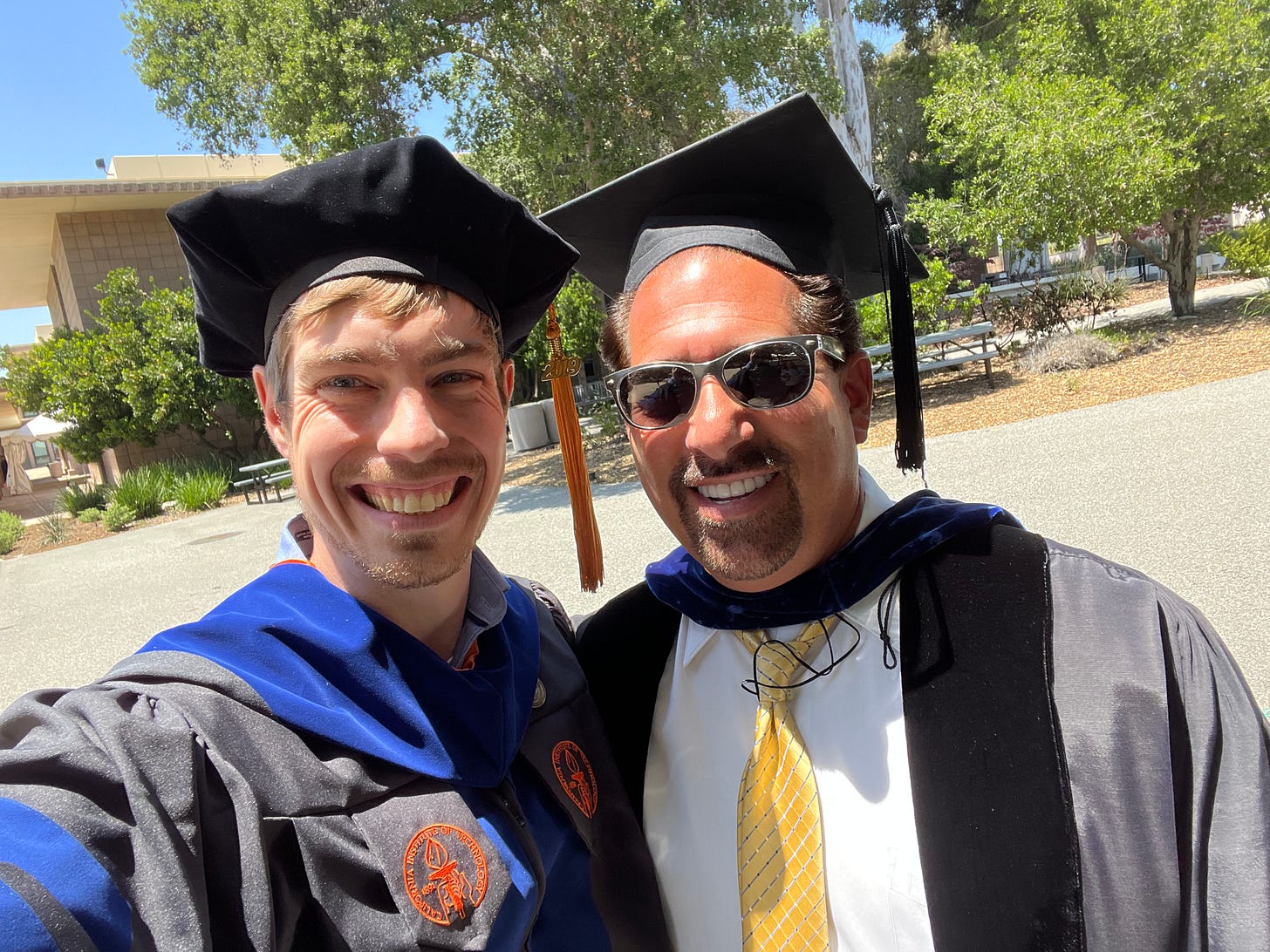
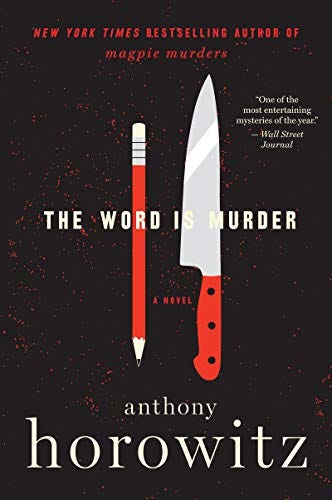


Your post may have aged a bit by this time, but it is of great interest and importance to me for a very good reason. I could not help but notice the leading photo of you with Professor Ziyad. He was my roommate and one of my best friends at Mudd! I am happy for him having retired from his long tenure at our alma mater. A flood of memories come back to me as I think about what we endured together from day one until graduation. In fact, we came to know each other before day one, as we met at a math/physics class at CalTech when we were high school seniors (and neither of us understood one whit of what was being taught by a wild hair grad student during those Saturday morning sessions). In our junior year, we became roommates at West Dorm, and he taught me one of my most important lessons that I ever learned at Mudd, ever. I was the studious one, hardly ever missing a beat when it came to studying and doing homework. And what did Zee do for me? At least once a week if not more often, he would urge me to leave my desk (that's putting it mildly) and go outside with him to play catch with a baseball. We threw that hardball back and forth to each other on the lawn between West and South dorms until it was dinner time, and could he ever throw hard! The very worst thing would be if I missed catching the ball, then I had to think quickly about the ball bouncing off the cinderblock wall and threatening to nail me from behind. The lesson he taught me was that friendship is far more important than just about anything else, especially getting good grades at Harvey Mudd! I would have missed that lesson entirely had it not been for Ziyad.
Years later, after I had survived brain surgery in 2008 and was getting around using trains, public transit, and walking, I called ahead and made an appointment to see my old roommate while he was chair of the engineering department. When we finally met in his office, I presented him with something he wasn't quite expecting: me with a baseball and mitt, urging him to go outside and play catch. On that day, we went outside and played catch once more. And he could still throw that ball like a rocket!
Your colleague sounds like an amazing person. Thanks for sharing these reflections. I may put this on my office wall: “It’s not wrong to appreciate marks of external validation, but make sure they are plaques on the wall and not bricks in the foundation.”